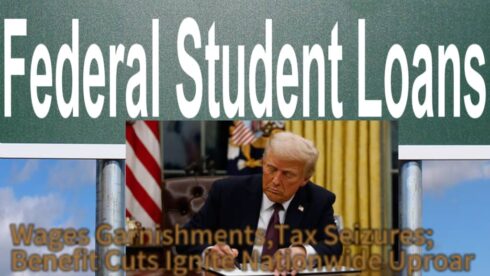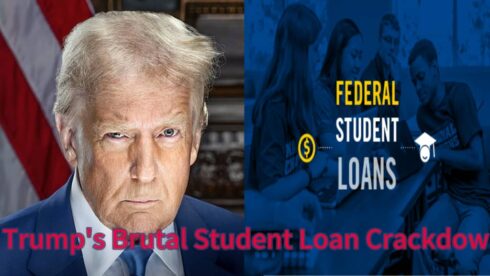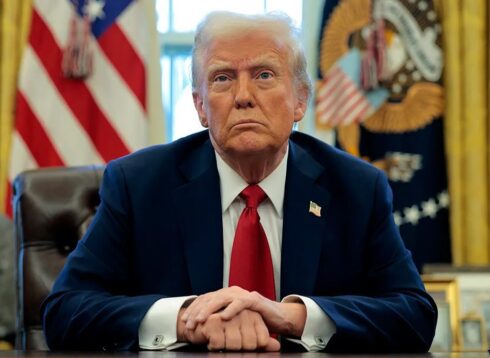Donald Trump, in a recent press release from Mar-a-Lago, defended his administration’s decision to resurrect stringent student loan recovery measures, calling it a move to “restore fiscal discipline and personal responsibility.” The president emphasized that American taxpayers should not be burdened with what he termed “irresponsible borrowing,” suggesting that the revival of wage garnishments, tax refund seizures, and Social Security withholding is necessary to combat what he views as a growing culture of entitlement.
This development marks a dramatic policy reversal from the pandemic-era protections that temporarily shielded over 7 million defaulted borrowers from collections. Trump’s renewed approach empowers the Department of Education and affiliated collection agencies to enforce judgments without court orders, leading to immediate deductions from paychecks, federal benefits, and refunds—often without borrowers’ prior knowledge. Legal analysts warn that this aggressive strategy could reignite socioeconomic tensions across the country.
Wage Garnishments Resume Amidst Soaring Living Costs
Trump administration insiders argue that reinstating wage garnishments on student loan defaulters is vital to reduce ballooning national debt. “There’s no time like now to correct fiscal rot,” Trump stated. However, critics counter that seizing wages in an era of record inflation and stagnant wages risks plunging vulnerable borrowers deeper into poverty. Average garnishments range from 15% to 25% of disposable income, impacting families already struggling with housing, food, and utility costs.
Borrowers report sudden paycheck deductions with minimal notification, pushing them into financial panic. Advocates say these policies lack compassion, especially for individuals in low-income brackets or those facing chronic unemployment. “The administration is prioritizing balance sheets over basic human dignity,” said Natalie Montrose, director of the National Student Debt Justice Alliance. The practice, she argues, disproportionately affects Black and Latino communities, exacerbating racial wealth disparities.
Tax Refund Seizures Spark Public Outrage and Legal Challenges
Donald Trump unapologetically supported the controversial policy of intercepting tax refunds, labeling it a “fair exchange for debts owed to the American people.” For millions of Americans, however, tax refunds represent a critical financial lifeline. With refund season underway, many families were blindsided to discover their returns confiscated in full to repay delinquent student loans, leading to widespread social media uproar and multiple class-action lawsuits.
Consumer rights organizations have condemned the lack of transparency and due process. Several plaintiffs argue they were not given sufficient notice or a chance to appeal. “It’s financial ambush,” claimed civil rights attorney Marcus Littlefield. Meanwhile, Republican lawmakers have rallied behind Trump’s initiative, framing it as a long-overdue enforcement of accountability. Yet legal scholars predict escalating litigation could force the courts to revisit the constitutionality of such unilateral actions.
Federal Benefits Now Targeted: Seniors and Disabled Hit Hardest

In a move that has drawn scathing criticism from disability advocates, the Donald Trump administration has authorized the garnishment of federal benefits—including Social Security and disability payments—for student loan repayment. Trump maintains that “no one is above paying their debt,” but elderly and disabled Americans argue that their fixed incomes are now under siege, often reduced below subsistence levels due to these withholdings.
For beneficiaries relying on modest monthly checks to cover basic needs, the impact is severe. Testimonies from affected individuals describe choosing between medications and meals. Elder rights groups argue the administration’s decision violates statutory protections and could lead to increased homelessness and mortality among senior citizens. “It’s financial euthanasia,” warned Dr. Arlene Cho, a geriatric specialist and advocate for senior economic security.
Donald Trump Defends Move as Economic ‘Correction’ While Critics Decry Moral Failure
Donald Trump framed the policy as a form of economic correction aimed at repairing what he calls “a broken debt culture enabled by liberal handouts.” He accused the Biden-era moratorium on collections of incentivizing default and called for stricter enforcement to rebuild trust in the federal lending system. Supporters of the move, including fiscal conservatives, argue that the crackdown will deter future defaults and restore loan program solvency.
Opponents, however, argue that the aggressive collections are a moral failure that ignores the root causes of student debt—skyrocketing tuition, predatory lending, and economic stagnation. Critics believe the approach disproportionately punishes the poor while doing little to reform the education financing system. “It’s a policy rooted in cruelty, not correction,” said U.S. Representative Ilhan Omar, who called for urgent legislative protections for borrowers.
Will the Courts or Congress Rein in Donald Trump’s Collection Revival?
Donald Trump remains defiant, declaring that his administration is “just getting started” and warning that further enforcement tools may be deployed. Yet legal experts predict that the aggressive collection tactics will soon face judicial scrutiny. Federal courts are already fielding multiple lawsuits on grounds of constitutional rights violations and abuse of administrative power, with hearings expected later this year.
Congressional Democrats have proposed emergency legislation to reinstate borrower protections and impose strict oversight on federal loan collections. However, with a politically polarized Capitol Hill, swift intervention remains uncertain. As Trump eyes another presidential bid, this divisive policy could become a defining issue in the 2026 elections—pitting economic nationalism against populist demand for debt relief.














